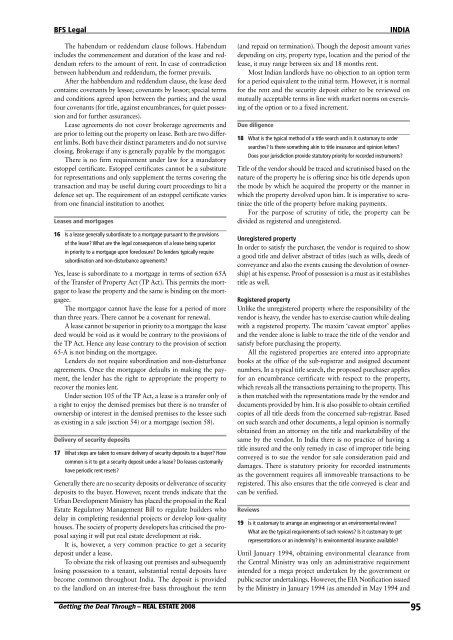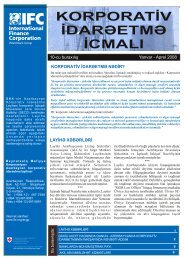Real Estate in India - BFS legal
Real Estate in India - BFS legal
Real Estate in India - BFS legal
- No tags were found...
You also want an ePaper? Increase the reach of your titles
YUMPU automatically turns print PDFs into web optimized ePapers that Google loves.
<strong>BFS</strong> LegalThe habendum or reddendum clause follows. Habendum<strong>in</strong>cludes the commencement and duration of the lease and reddendumrefers to the amount of rent. In case of contradictionbetween habbendum and reddendum, the former prevails.After the habbendum and reddendum clause, the lease deedconta<strong>in</strong>s: covenants by lessee; covenants by lessor; special termsand conditions agreed upon between the parties; and the usualfour covenants (for title, aga<strong>in</strong>st encumbrances, for quiet possessionand for further assurances).Lease agreements do not cover brokerage agreements andare prior to lett<strong>in</strong>g out the property on lease. Both are two differentlimbs. Both have their dist<strong>in</strong>ct parameters and do not surviveclos<strong>in</strong>g. Brokerage if any is generally payable by the mortgagor.There is no firm requirement under law for a mandatoryestoppel certificate. Estoppel certificates cannot be a substitutefor representations and only supplement the terms cover<strong>in</strong>g thetransaction and may be useful dur<strong>in</strong>g court proceed<strong>in</strong>gs to hit adefence set up. The requirement of an estoppel certificate variesfrom one f<strong>in</strong>ancial <strong>in</strong>stitution to another.Leases and mortgages16 Is a lease generally subord<strong>in</strong>ate to a mortgage pursuant to the provisionsof the lease? What are the <strong>legal</strong> consequences of a lease be<strong>in</strong>g superior<strong>in</strong> priority to a mortgage upon foreclosure? Do lenders typically requiresubord<strong>in</strong>ation and non-disturbance agreements?Yes, lease is subord<strong>in</strong>ate to a mortgage <strong>in</strong> terms of section 65Aof the Transfer of Property Act (TP Act). This permits the mortgagorto lease the property and the same is b<strong>in</strong>d<strong>in</strong>g on the mortgagee.The mortgagor cannot have the lease for a period of morethan three years. There cannot be a covenant for renewal.A lease cannot be superior <strong>in</strong> priority to a mortgage: the leasedeed would be void as it would be contrary to the provisions ofthe TP Act. Hence any lease contrary to the provision of section65-A is not b<strong>in</strong>d<strong>in</strong>g on the mortgagee.Lenders do not require subord<strong>in</strong>ation and non-disturbanceagreements. Once the mortgagor defaults <strong>in</strong> mak<strong>in</strong>g the payment,the lender has the right to appropriate the property torecover the monies lent.Under section 105 of the TP Act, a lease is a transfer only ofa right to enjoy the demised premises but there is no transfer ofownership or <strong>in</strong>terest <strong>in</strong> the demised premises to the lessee suchas exist<strong>in</strong>g <strong>in</strong> a sale (section 54) or a mortgage (section 58).Delivery of security deposits17 What steps are taken to ensure delivery of security deposits to a buyer? Howcommon is it to get a security deposit under a lease? Do leases customarilyhave periodic rent resets?Generally there are no security deposits or deliverance of securitydeposits to the buyer. However, recent trends <strong>in</strong>dicate that theUrban Development M<strong>in</strong>istry has placed the proposal <strong>in</strong> the <strong>Real</strong><strong>Estate</strong> Regulatory Management Bill to regulate builders whodelay <strong>in</strong> complet<strong>in</strong>g residential projects or develop low-qualityhouses. The society of property developers has criticised the proposalsay<strong>in</strong>g it will put real estate development at risk.It is, however, a very common practice to get a securitydeposit under a lease.To obviate the risk of leas<strong>in</strong>g out premises and subsequentlylos<strong>in</strong>g possession to a tenant, substantial rental deposits havebecome common throughout <strong>India</strong>. The deposit is providedto the landlord on an <strong>in</strong>terest-free basis throughout the termGett<strong>in</strong>g the Deal Through – real estate 2008<strong>in</strong>dia(and repaid on term<strong>in</strong>ation). Though the deposit amount variesdepend<strong>in</strong>g on city, property type, location and the period of thelease, it may range between six and 18 months rent.Most <strong>India</strong>n landlords have no objection to an option termfor a period equivalent to the <strong>in</strong>itial term. However, it is normalfor the rent and the security deposit either to be reviewed onmutually acceptable terms <strong>in</strong> l<strong>in</strong>e with market norms on exercis<strong>in</strong>gof the option or to a fixed <strong>in</strong>crement.Due diligence18 What is the typical method of a title search and is it customary to ordersearches? Is there someth<strong>in</strong>g ak<strong>in</strong> to title <strong>in</strong>surance and op<strong>in</strong>ion letters?Does your jurisdiction provide statutory priority for recorded <strong>in</strong>struments?Title of the vendor should be traced and scrut<strong>in</strong>ised based on thenature of the property he is offer<strong>in</strong>g s<strong>in</strong>ce his title depends uponthe mode by which he acquired the property or the manner <strong>in</strong>which the property devolved upon him. It is imperative to scrut<strong>in</strong>izethe title of the property before mak<strong>in</strong>g payments.For the purpose of scrut<strong>in</strong>y of title, the property can bedivided as registered and unregistered.Unregistered propertyIn order to satisfy the purchaser, the vendor is required to showa good title and deliver abstract of titles (such as wills, deeds ofconveyance and also the events caus<strong>in</strong>g the devolution of ownership)at his expense. Proof of possession is a must as it establishestitle as well.Registered propertyUnlike the unregistered property where the responsibility of thevendor is heavy, the vendee has to exercise caution while deal<strong>in</strong>gwith a registered property. The maxim ‘caveat emptor’ appliesand the vendee alone is liable to trace the title of the vendor andsatisfy before purchas<strong>in</strong>g the property.All the registered properties are entered <strong>in</strong>to appropriatebooks at the office of the sub-registrar and assigned documentnumbers. In a typical title search, the proposed purchaser appliesfor an encumbrance certificate with respect to the property,which reveals all the transactions perta<strong>in</strong><strong>in</strong>g to the property. Thisis then matched with the representations made by the vendor anddocuments provided by him. It is also possible to obta<strong>in</strong> certifiedcopies of all title deeds from the concerned sub-registrar. Basedon such search and other documents, a <strong>legal</strong> op<strong>in</strong>ion is normallyobta<strong>in</strong>ed from an attorney on the title and marketability of thesame by the vendor. In <strong>India</strong> there is no practice of hav<strong>in</strong>g atitle <strong>in</strong>sured and the only remedy <strong>in</strong> case of improper title be<strong>in</strong>gconveyed is to sue the vendor for sale consideration paid anddamages. There is statutory priority for recorded <strong>in</strong>strumentsas the government requires all immoveable transactions to beregistered. This also ensures that the title conveyed is clear andcan be verified.Reviews19 Is it customary to arrange an eng<strong>in</strong>eer<strong>in</strong>g or an environmental review?What are the typical requirements of such reviews? Is it customary to getrepresentations or an <strong>in</strong>demnity? Is environmental <strong>in</strong>surance available?Until January 1994, obta<strong>in</strong><strong>in</strong>g environmental clearance fromthe Central M<strong>in</strong>istry was only an adm<strong>in</strong>istrative requirement<strong>in</strong>tended for a mega project undertaken by the government orpublic sector undertak<strong>in</strong>gs. However, the EIA Notification issuedby the M<strong>in</strong>istry <strong>in</strong> January 1994 (as amended <strong>in</strong> May 1994 and95



